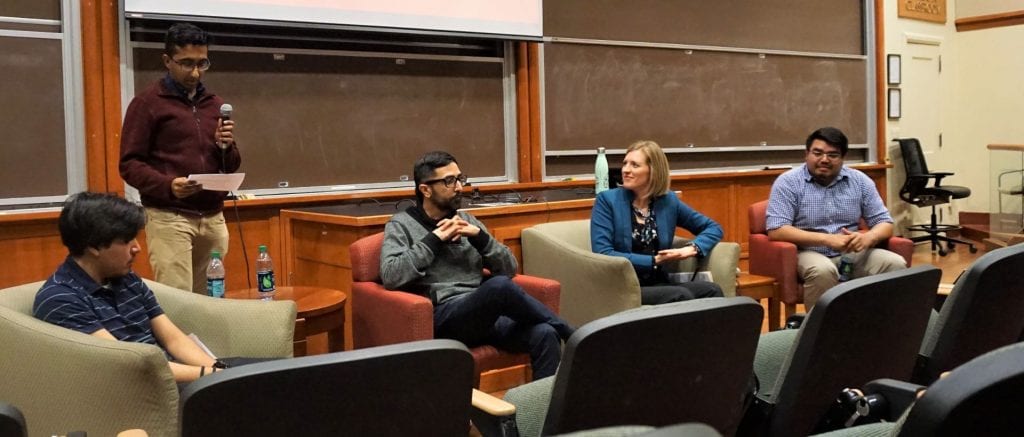
The Gephardt Institute’s Each One Teach One program recently held an enrichment event on a crucial topic facing educators and administrators across the country: the educational rights of undocumented students and families and the barriers they may face in school. The panel attracted over 80 attendees, among whom were students, faculty, staff, and community members. The four panelists—Robert Sagastume, Félipe Martínez, Roberto Munive, and Katie Herbert Meyer—discussed their experiences with immigration and the St. Louis area school system, emphasizing ways that St. Louis schools can support the needs of undocumented students.
Robert Sagastume is pursuing master of social work and master of social policy degrees at the Brown School. Dedicated to helping underrepresented communities, he has served as a board member for Missouri Immigrant & Refugee Advocates (MIRA) and as a co-director at the Kansas/Missouri Dream Alliance (KSMODA). Félipe Martínez serves as the Immigrant Student Advisor at the Scholarship Foundation of St. Louis, which works to support undocumented students’ access to post-secondary education. They have provided significant training and resource support to St. Louis area guidance counselors and nonprofit program personnel new to the issues facing undocumented students. Roberto Munive is a first-generation college student who completed two years at Florissant Valley Community College and is graduating from St. Louis University with a degree in political science. He plans to work in immigration law to improve the lives of immigrants. Katie Herbert Meyer is an Assistant Professor of Practice and Director of the Immigration Clinic at the Washington University School of Law. Before joining the faculty at WashU, she spent 15 years practicing immigration law, primarily in the non-profit sector. Most recently, she served as the Program Coordinator and Supervising Attorney at the Migrant and Immigrant Community Action (MICA) Project in St. Louis.
The panelists began the discussion by defining “undocumented,” which means that a person does not have authorization to be in the U.S. Panelists noted the prevalence of mixed status families, in which some members are citizens, others are lawful permanent residents (aka “green card holders”), and others are undocumented. They discussed that this issue is critical in the struggle to provide an equitable education for all students. The panelists noted how schools can and should prepare students to face barriers that they may encounter later in life instead of making the lives of immigrant students more difficult. Finally, they noted that this issue is especially pertinent to St. Louis, since the area has one of the fastest growing immigrant populations.
The panelists emphasized the importance of teachers and counselors gaining the information and tools that they need to support all students. Some of the suggestions for better supporting undocumented students included questioning schools’ policing policies, creating more visible and positive messaging surrounding immigration, training educators on how to respond to anti-immigration stances, and better attending to social and emotional needs by creating spaces for immigrant students to discuss their experiences safely. The panelists also discussed the history and legal framework surrounding the issue. They encouraged attendees to take action at the local, state, or national levels in order to ensure that undocumented students and students from immigrant families can feel safe and supported in school.
Learn more about how to get involved in the Gephardt Institute’s K-12 and Youth Initiatives here.
The Gephardt Institute is a politically neutral institution. The opinions expressed are those of the panelists and not indicative of university sponsorship or support of any political cause or position.